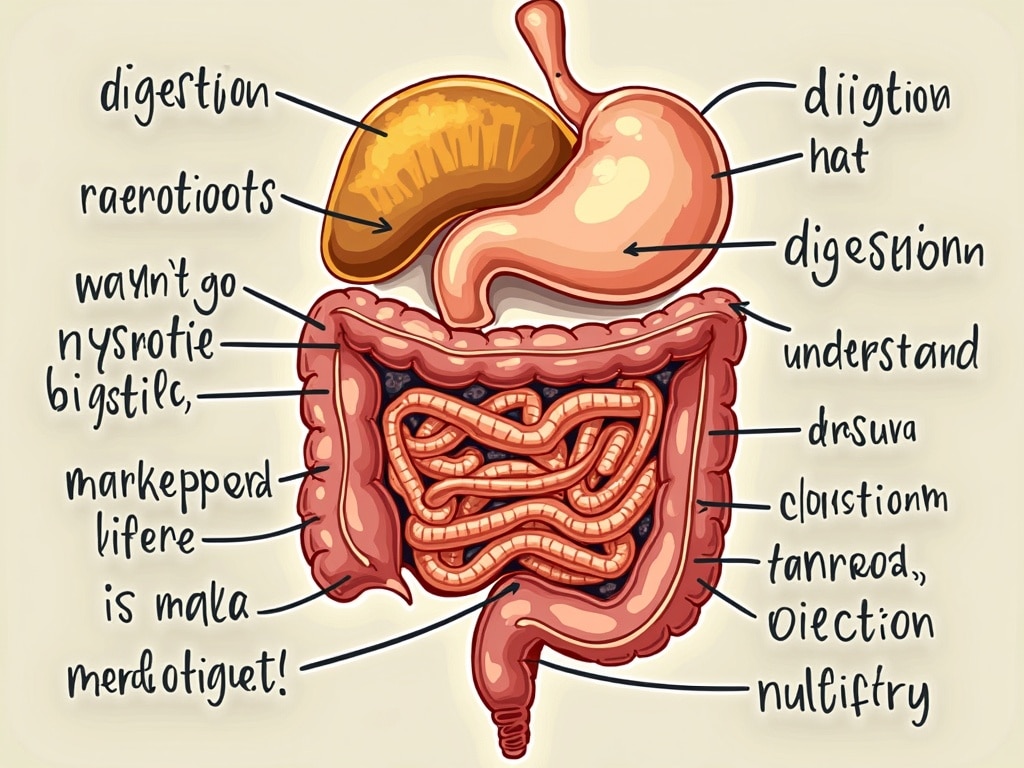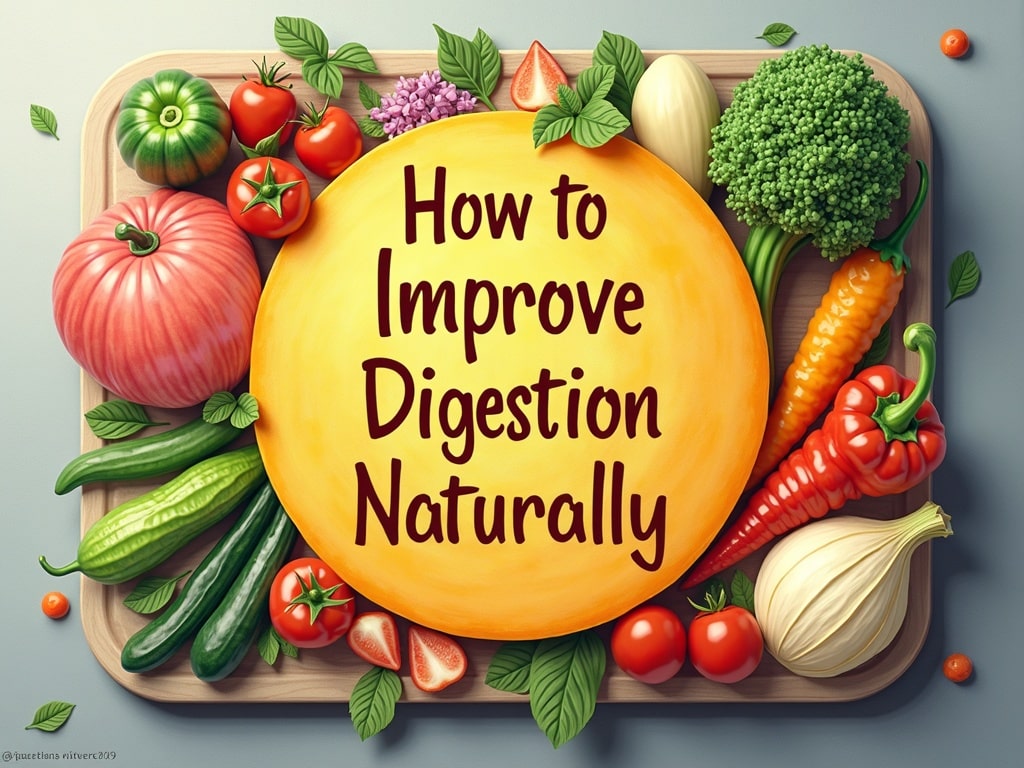How to Improve Digestion Naturally: A Comprehensive Guide
That gnawing feeling after a meal, the uncomfortable bloat, the unpredictable bathroom trips… Digestion problems can throw a serious wrench into your daily life. But before you resign yourself to a life of antacids and discomfort, know this: your gut is remarkably responsive to natural interventions. This isn't about quick fixes; it's about cultivating a digestive environment that thrives. Ready to embark on a journey to better gut health? Let’s dive in.
Understanding the Digestive Process
Before we explore solutions, it’s crucial to understand how digestion works. It’s a complex, multi-stage process that begins the moment you think about food. From the release of saliva in your mouth to the absorption of nutrients in your small intestine, each step plays a vital role.
The Key Players: Organs and Enzymes
- Mouth: Chewing breaks down food, while saliva begins carbohydrate digestion.
- Esophagus: This muscular tube transports food to the stomach.
- Stomach: Gastric juices, including hydrochloric acid and enzymes, further break down food.
- Small Intestine: The primary site of nutrient absorption. Bile from the liver and enzymes from the pancreas aid in this process.
- Large Intestine: Absorbs water and electrolytes, forming stool.
- Liver & Pancreas: These organs secrete essential digestive juices and enzymes into the small intestine.
Digestive enzymes are proteins that speed up chemical reactions, breaking down large molecules of food into smaller ones that your body can absorb. Insufficient enzyme production can lead to incomplete digestion and uncomfortable symptoms.
Common Causes of Digestive Issues
Numerous factors can disrupt the delicate balance of your digestive system. Identifying potential culprits is the first step towards finding relief.
- Poor Diet: Processed foods, excessive sugar, and unhealthy fats can wreak havoc on gut health.
- Stress: Chronic stress can interfere with digestive processes, leading to symptoms like bloating and constipation.
- Dehydration: Water is essential for moving food through the digestive tract.
- Lack of Fiber: Fiber adds bulk to stool, promoting regular bowel movements.
- Food Intolerances: Sensitivities to foods like gluten or lactose can cause inflammation and digestive upset.
- Medications: Some medications, like antibiotics, can disrupt the balance of gut bacteria.
- Underlying Conditions: Conditions like Irritable Bowel Syndrome (IBS), Crohn’s disease, and ulcerative colitis can significantly impact digestion.
Natural Strategies to Improve Digestion
Fortunately, there are many natural and effective ways to support healthy digestion. These strategies focus on nourishing your gut, reducing inflammation, and promoting optimal digestive function.
1. Embrace Mindful Eating
Digestion begins in the mind. Rushing through meals and eating on the go can hinder the digestive process. Mindful eating involves paying attention to your food, savoring each bite, and eating slowly. This allows your body to produce adequate digestive enzymes and properly break down food.
- Eliminate distractions: Turn off the TV and put away your phone.
- Chew thoroughly: Aim for 20-30 chews per bite.
- Focus on the flavors and textures: Engage all your senses.
- Eat in a relaxed environment: Avoid eating when you're stressed or rushed.
2. Optimize Your Diet
What you eat has a profound impact on your digestive health. Prioritizing whole, unprocessed foods and limiting inflammatory foods can make a significant difference.
- Increase Fiber Intake: Fiber-rich foods like fruits, vegetables, and whole grains promote regularity and feed beneficial gut bacteria. Good sources include:
- Fruits: Apples, bananas, berries
- Vegetables: Broccoli, spinach, carrots
- Whole Grains: Oats, quinoa, brown rice
- Legumes: Lentils, chickpeas, beans
- Limit Processed Foods: Highly processed foods are often low in fiber and nutrients and high in unhealthy fats and additives, which can disrupt gut health.
- Reduce Sugar Intake: Excessive sugar can feed harmful bacteria in the gut and contribute to inflammation.
- Incorporate Healthy Fats: Omega-3 fatty acids, found in fatty fish, flaxseeds, and walnuts, have anti-inflammatory properties that can benefit gut health.
3. Stay Hydrated
Water is essential for proper digestion. It helps to soften stool, preventing constipation, and aids in the absorption of nutrients. Aim to drink at least eight glasses of water per day.
- Carry a water bottle with you: This serves as a visual reminder to drink throughout the day.
- Drink water before, during, and after meals: This can help to promote optimal digestion.
- Eat water-rich foods: Fruits and vegetables like watermelon, cucumbers, and celery can contribute to your daily fluid intake.
4. Incorporate Probiotics and Prebiotics
Probiotics are beneficial bacteria that live in your gut and play a crucial role in digestion, immunity, and overall health. Prebiotics are non-digestible fibers that feed these beneficial bacteria.
- Probiotic-Rich Foods:
- Yogurt: Choose yogurt with live and active cultures.
- Kefir: A fermented milk drink similar to yogurt.
- Sauerkraut: Fermented cabbage.
- Kimchi: A Korean fermented dish.
- Kombucha: A fermented tea.
- Prebiotic-Rich Foods:
- Garlic: A potent prebiotic food.
- Onions: Another excellent source of prebiotics.
- Asparagus: A good source of inulin, a type of prebiotic fiber.
- Bananas: Especially green bananas, which are higher in resistant starch.
- Oats: Contain beta-glucan, a type of prebiotic fiber.
- Probiotic Supplements: Consider taking a probiotic supplement, especially if you have digestive issues or have recently taken antibiotics. Consult with a healthcare professional to determine the best strain and dosage for your needs.

5. Manage Stress
Stress can significantly impact digestion. When you're stressed, your body enters fight or flight mode, diverting resources away from digestion. Chronic stress can lead to a variety of digestive problems, including bloating, constipation, and diarrhea.
- Practice Relaxation Techniques:
- Meditation: Even a few minutes of daily meditation can help to reduce stress and improve digestion.
- Deep Breathing Exercises: Slow, deep breaths can calm the nervous system and promote relaxation.
- Yoga: Combines physical postures, breathing techniques, and meditation to reduce stress and improve overall well-being.
- Get Regular Exercise: Exercise can help to reduce stress and improve mood.
- Prioritize Sleep: Aim for 7-8 hours of sleep per night.
- Spend Time in Nature: Studies have shown that spending time in nature can reduce stress and improve overall health.
6. Consider Digestive Enzymes
Digestive enzyme supplements can help to break down food and improve nutrient absorption, especially if you have enzyme deficiencies. They can be particularly helpful for people with conditions like lactose intolerance or those who experience bloating after meals.
- Types of Digestive Enzymes:
- Amylase: Breaks down carbohydrates.
- Protease: Breaks down proteins.
- Lipase: Breaks down fats.
- Lactase: Breaks down lactose.
- When to Take Digestive Enzymes: Take digestive enzymes before or with meals.
- Consult with a Healthcare Professional: Talk to your doctor or a registered dietitian before taking digestive enzyme supplements to determine the appropriate type and dosage for your needs.
7. Natural Remedies for Specific Digestive Issues
Specific herbs and remedies can provide relief for common digestive complaints.
- Ginger: Known for its anti-inflammatory and anti-nausea properties. Can be consumed as tea, capsules, or added to meals.
- Peppermint: Relaxes the muscles of the digestive tract and can help to relieve gas and bloating. Peppermint tea is a popular choice.
- Chamomile: Has calming and anti-inflammatory properties. Chamomile tea can help to soothe digestive upset.
- Licorice Root: Can help to soothe the lining of the stomach and intestines.
- Apple Cider Vinegar: Some people find that a tablespoon of apple cider vinegar diluted in water before meals can improve digestion.
When to Seek Professional Help
While natural strategies can be highly effective, it's essential to seek professional help if you experience persistent or severe digestive symptoms. These may indicate an underlying medical condition that requires diagnosis and treatment.
Consult a doctor or gastroenterologist if you experience:
- Persistent abdominal pain
- Unexplained weight loss
- Blood in your stool
- Changes in bowel habits that last for more than a few weeks
- Severe bloating or gas
- Nausea or vomiting
The Takeaway: A Holistic Approach to Digestive Health
Improving digestion naturally isn't about finding a quick fix. It's about adopting a holistic approach that focuses on nourishing your gut, managing stress, and making sustainable lifestyle changes. By embracing mindful eating, optimizing your diet, staying hydrated, and incorporating probiotics and prebiotics, you can cultivate a healthy and thriving digestive system. Listen to your body, be patient with the process, and remember that small, consistent changes can make a world of difference. Your gut – and your overall well-being – will thank you for it.

